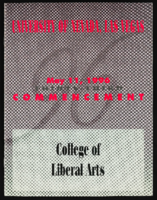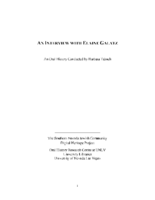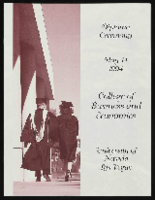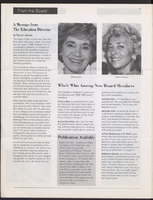Search the Special Collections and Archives Portal
Search Results

Stella Kalaoram oral history interview: transcript
Date
Archival Collection
Description
Oral history interview with Stella Kalaoram conducted by Kristel Peralta and Cecilia Winchell on August 2, 2021 for Reflections: The Las Vegas Asian American and Pacific Islander Oral History Project. Stella Kalaoram discusses her childhood in Singapore, the occupations and ethnic diversity of her family, and the four languages she speaks: English, Mandarin, Malay, and Tamil. She shares her immigration journey to the United States with her husband, from Singapore to San Bernardino, California in 1990, and their move to Las Vegas in 2000. Stella also shares her employment experiences as a dental assistant, a housekeeper for the Cosmopolitan Hotel and Casino, and as a shop steward for the Culinary Workers Union. She also talks about contracting COVID-19 and her hospital experience, her family's differing religious faiths, and her translation work to empower the Asian-American community. Subjects discussed include: insurance benefits; Volunteer Organizer (VO); mask mandates; vaccine hesitancy; food traditions; language barriers; Baba and Nyonya cultures.
Text

Transcript of interview with Perle Garrett by Marilyn Swanson, March 2, 1975
Date
Archival Collection
Description
On March 2, 1975, Marilyn Swanson interviewed her neighbor Perle Garrett (born April 27, 1905 in Overbrook, Kansas) in her home in Boulder City, Nevada. This interview covers Boulder City during the 1930s, with special focus on the building of Boulder Dam. Mrs. Garrett relocated to Boulder City because her husband Theodore Garrett was one of the workers at the dam. She also discusses Six Companies houses, family life, the weather, churches in Las Vegas and recreational activities for local children. Her husband is also present during the interview.
Text

Meeting minutes for Consolidated Student Senate, University of Nevada, Las Vegas, October 09, 2000
Date
Archival Collection
Description
Text

Sachiko Young oral history interview: transcript
Date
Archival Collection
Description
Oral history interview with Sachiko Young conducted by Mikaela Nettlow on December 5, 2021 for Reflections: The Las Vegas Asian American and Pacific Islander Oral History Project. Sachiko shares her upbringing in Fukoka, Japan and how she and her family moved frequently as a child. She talks about meeting her husband, an American military man, while visiting family in Tokyo. Sachiko discusses their marriage and birth of their child, their move to San Jose, California, and their travels back and forth from Japan before settling in Las Vegas, Nevada. She shares stories of visiting casinos with friends, working in hotel coffee shops, and what life was like for her and her family. Sachiko also talks of how she and her husband both faced racial prejudice from their families and the difficulties of learning English as a second language.
Text

University of Nevada, Las Vegas (UNLV) College of Liberal Arts 33rd commencement program
Date
Archival Collection
Description
Commencement program from University of Nevada, Las Vegas Commencement Programs and Graduation Lists (UA-00115).
Text

Transcript of interview with Elaine Galatz by Barbara Tabach, April 22, 2015
Date
Archival Collection
Description
Interview with Elaine Galatz by Barbara Tabach on April 22, 2015. In this interview, Galatz talks about growing up in Wisconsin. She attended the University of Wisconsin where she was an English major and active in Hillel and the Sigma Delta Tau sorority. She met her husband, Neil, while traveling through Las Vegas on several occasions, and sparks finally flew when she visited him in Tucson on a whim. She describes Neil's background in law, moving to Las Vegas together, and her job teaching second grade. She describes the small Jewish community in the 1960 including the Katzes, Brookmans, Freys, Molaskys and Greenspuns, and the current direction of the Jewish Federation. Galatz discusses raising her children, some of the cases that Neil worked on, their group of friends, and her love of horses.
Elaine Galatz was raised on a farm outside Madison, Wisconsin. Her father was a Russian immigrant father and her mother a young American born bride. Her father died when she was a teenager and her mother remarried a man who enjoyed gambling and that would lead her to first encounter with Las Vegas. Las Vegas would coincidentally become the center of her life when she and her husband of 51 years, Neil Galatz moved here in 1961. Elaine taught school briefly and worked in Neil's successful law firm for a number of years. Neil was a significant litigator in the MGM fire and PEPCON explosion cases. The couple also shared in the growth of Las Vegas Jewish community. Elaine served as Jewish Federation president, the second woman to hold that office. Among their favorite shared family activities was a love of Morgan horses, which continues to present day for Elaine.
Text
Dorothy Eisenberg Papers
Identifier
Abstract
The Dorothy Eisenberg Papers (early 1900s-2009, bulk 1970-2000) are comprised of organizational records, photographs, newspaper clippings, and scrapbooks reflecting her activism and volunteer work related to education, the Bullfrog County Commission, Las Vegas Clark County consolidation, League of Women Voters (LWV), Las Vegas Jewish Federation, Equal Rights Amendment (ERA), and Silver State Political Action Committee.
Archival Collection

Dani McLaughlin oral history interview: transcript
Date
Archival Collection
Description
Oral history interview with Dani McLaughlin conducted by Barbara Tabach on February 14, 2018 for the Remembering 1 October Oral History Project. In this interview, Dani McLaughlin discusses the October 1, 2017 mass shooting in Las Vegas, Nevada and how she tried to find safety with her husband and a group of friends, one of whom was shot. She talks about finding refuge in her office at Atlantic Aviation. McLaughlin mentions the different ways her life and the lives of her family members have been affected, including how her children reacted to the shooting.
Text

University of Nevada, Las Vegas (UNLV) College of Business and Economics Diploma Ceremony program
Date
Archival Collection
Description
Commencement program from University of Nevada, Las Vegas Commencement Programs and Graduation Lists (UA-00115).
Text

